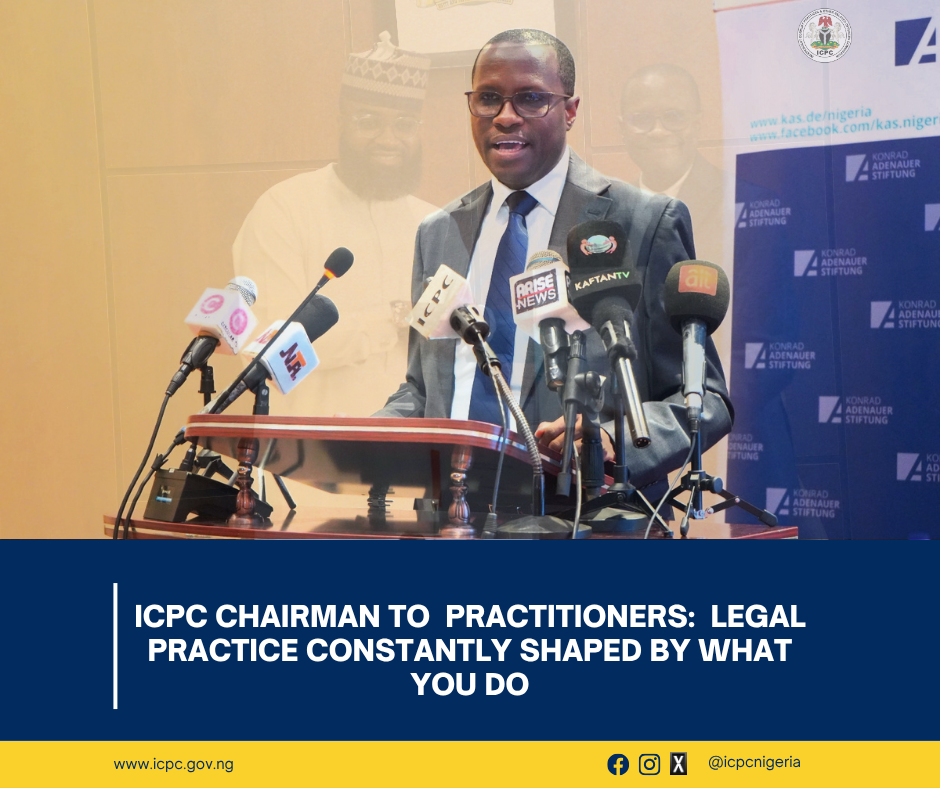The Chairman of the Independent Corrupt Practices and Other Related Offences Commission (ICPC) has once again reiterated the critical need for legal practitioners to be ethical in their conduct.
Speaking at the official launch of the legal-oriented publication Ungogo Bar Voice in Kano, Dr. Musa Adamu Aliyu, SAN observed that for him, the publication serves more than just a scholarly journal.
The ICPC boss said the magazine serves as a platform for professional reflection, engagement, and a reform instrument.
He charged participants to reflect on the direction of the legal profession and added that day by the day, public perception of legal practice is being shaped by what practitioners do or fail to do.
He noted that ethics, which is known as the bedrock of the legal profession, “is now facing threats from rising allegations of professional misconduct and complicity in acts that undermine the very system we swore to defend”.
He reminded the audience of his belief that lawyers are not just advocates, but are, in all senses of reality, gatekeepers of justice.
The ICPC boss stated that lawyers must not allow themselves to become instruments of impunity under the guise of legal representation; hence, the huge intellectual engagement offered by the publication being launched.
Dr. Aliyu further called for a push to encourage legal academics and practitioners within the branch, for sustained scrutiny of decisions emanating from courts in Kano State and beyond.
He stated that he believed the described activities would form part of the steps to advancing scholarship.
Aliyu further charged legal practitioners and judges to strive to do their very best in advancing the cause of justice for posterity. He stated that with Artificial Intelligence making inroads, submissions and decisions by counsel and judges will soon become globally accessible at the world’s fingertips.
In his words: “Legal innovation is also reshaping our professional landscape. From e-filing to virtual hearings, we must embrace technology, but always within the bounds of ethical practice. As I’ve emphasised elsewhere, innovation without regulation can erode public confidence in justice. Legal tech must serve justice, not reduce it to a mere transaction”.
Speaking further, the ICPC boss said: “We must prioritise reform in legal education. Ethics, public interest law, and digital literacy must become core components in training the next generation of lawyers. As lawyers, we must confront corruption head-on.
In light of recent judgments particularly the Supreme Court’s decision on local government autonomy, we must defend the doctrine of judicial precedent. I appeal to all of us as lawyers: do not lend your skills to undermining apex court decisions through diversionary or frivolous suits. We have a responsibility to preserve the integrity of the judicial system”.
In wrapping up his address, Aliyu said: “Let Ungogo Bar Voice become a beacon of responsible legal commentary, professional development, and ethical consciousness in the Nigerian Bar.
Another legal luminary, Mike Ozekhome, SAN, reminded participants that while court judgments are subject to scrutiny, personal attacks on judges that cross ethical lines have become a recurrent occurrence.
Ozekhome urged that the focus of criticism should be on judgments and not the judges. He added that energy should be deployed to advance justice and not to undermine it.
A dignitary at the event, Justice Helen Ogunwumiju, urged legal academics and practitioners to constructively critique judicial decisions.
She urged legal practitioners to align with strengthening jurisprudence and giving unwavering support to legal reform.


